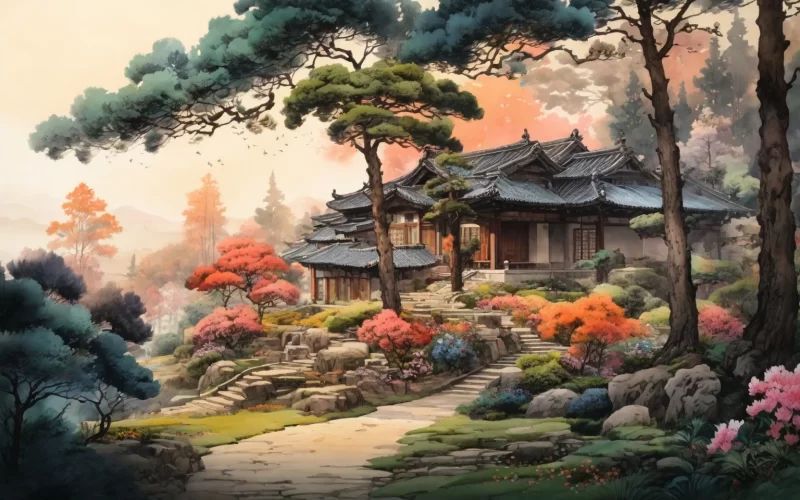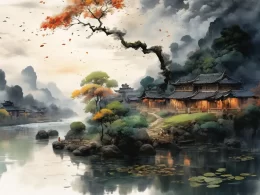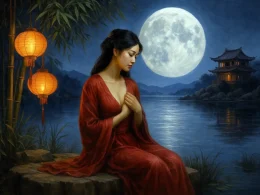At night I lodge the temple on the peak;
I can touch the stars with my hand.
I dare not speak aloud in the high place
For fear of disturbing the dwellers in the moon.
Original Poem
「题峰顶寺」
李白
夜宿峰顶寺,举手扪星辰。
不敢高声语,恐惊天上人。
Interpretation
Composed during Li Bai's early wandering years (though the exact date remains uncertain), this poem stands as one of the most iconic short verses in Chinese poetic history through its transcendent imagination and pure artistic conception. The location of "Peak Temple" is unverifiable, which ironically transforms it into a symbol of all sublime realms, carrying the poet's romantic fantasies about the cosmos and the boundaries between mortal and immortal worlds.
First Couplet: "夜宿峰顶寺,举手扪星辰。"
Yè sù fēng dǐng sì, jǔ shǒu mén xīngchén.
Lodging overnight at the peak's temple; Raising hands, I touch the stars' assembly.
The opening approaches with straightforward narration yet contains thunderous imagination. "Raising hands, I touch the stars" represents ultimate hyperbole—not only constructing a visual marvel where temple and stars exist within arm's reach but also achieving the first tactile "contact" between mortal and celestial realms. The verb "touch" pulls the unreachable stars into perceptible range, embodying Li Bai's signature romantic brushwork.
Second Couplet: "不敢高声语,恐惊天上人。"
Bù gǎn gāo shēng yǔ, kǒng jīng tiānshàng rén.
I dare not speak aloud; Fear disturbing heaven's crowd.
This couplet elevates the conception and reveals the poetic essence. Following the physical exaggeration of the previous line, the poet shifts to psychological subtlety. "Dare not" and "fear disturbing" transform boldness into reverent, cautious silence. This turn instantly makes the previously illusory "heavenly beings" feel real and tangible, as if residing just beyond the clouds, separated only by a whisper. This transcends describing the mountain's height to construct a fantastical cosmos where mortal and immortal realms neighbor, humans and deities coexist.
Holistic Appreciation
The poem's artistic charm lies in constructing a complete psychological drama. Twenty characters present a full emotional chain: "action (raising hands) - perception (touching stars) - psychology (dare not) - imagination (fear disturbing)." It resembles a miniature one-act play: the poet as protagonist, Peak Temple as stage, stars and heavenly beings as unseen yet atmosphere-dominating characters. The poetic tension stems from the contrast between "height" and "quietness"—the environment is supremely high, yet behavior must be extremely gentle. Within this极致 contrast, the poet's awe toward the cosmos, curiosity about the immortal realm, and subtle mentality of integration are expressed most vividly. It epitomizes the High Tang literati's spiritual portrait of attempting to break mortal constraints and dialogue with higher existence.
Artistic Merits
- Perfect Fusion of Exaggeration and Reality: Though "touching stars" represents extreme hyperbole, its foundation in the tangible "peak temple" setting and the universal sensation of proximity to the sky when ascending heights renders it both astonishing and psychologically credible.
- Emotional Transition from Movement to Stillness: The rhythm shifts from active "raising hands" to restrained "dare not speak," creating huge emotional tension and enriching poetic layers.
- Fairytale-like Pure Conception: The language is simple as speech, yet the imagination is magnificently extraordinary, permeated with childlike innocence untouched by worldly affairs—precisely why it transcends age barriers for widespread recitation.
- Ultimate Application of Negative Space: The poem ends abruptly at "fear disturbing heaven's crowd." What happens next? Do heavenly beings truly exist? The poet leaves infinite blanks for readers to imagine and complete.
Insights
This poem gifts us an aesthetic perspective to reexamine the world. It teaches that poetry isn't distant from life but stems from unusual contemplation of ordinary things (like ascending heights). Li Bai shows us an ability to "marvel"—discovering magic in the mundane, hearing the cosmos breathe in silence. In our era dominated by rationality and pragmatism, this poem reminds us how crucial it is to guard that sensitivity and awe of "fearing to disturb heaven's crowd." It may not concern religious belief but rather maintaining humble and romantic imagination toward nature, the cosmos, and the unknown. This ability lets us constantly discover life's grandeur and mystery within ordinary routines, preserving a sublime realm where the soul can "touch the stars."
About the poet

Li Bai (李白), 701 - 762 A.D., whose ancestral home was in Gansu, was preceded by Li Guang, a general of the Han Dynasty. Tang poetry is one of the brightest constellations in the history of Chinese literature, and one of the brightest stars is Li Bai.












